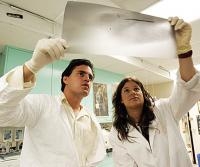Urgent to bring science closer to people
Submitted on 9 July 2006 - 11:10am
This article is reproduced by CienciaPR with permission from the original source.
CienciaPR Contribution:
The Professional is a member of CienciaPR

By Mónica I. Feliú Mójer/ Special for El Nuevo Dia
endi.com
Modern society depends on science, research and its applications to function properly. Transportation, media, medical advances, and our knowledge about the human body and the Universe, are a result of scientific knowledge.
Given this “close” relationship, society should have a profound understanding about science, its impact and consequences. However, there is an overwhelming scientific illiteracy that has created a huge gap between science and the society it wants to benefit.
Understanding comes from knowledge. In an essay for the journal Science, Sydney Brenner, genetics pioneer and Nobel laureate writes: “…it is necessary for scientists to communicate to society at large not only the content, use, and misuse of scientific discoveries, but also what their work tells us about the intrinsic limitations of our bodies and minds.”
Throughout history, the “crazy scientist” image has been perpetuated; a lot of people think science is boring and all scientists are nerds. Nothing is farther from truth. American physicist Isidor Isaac Rabi said: “[Science is] a great game. It is inspiring and refreshing. The playing field is the universe itself.” Science provides amazing intellectual rewards. “Necessity is the mother of all inventions”, goes the popular saying. The need to discover and learn has been the engine of science and humanity through centuries; is what makes us Homo sapiens.
But the advancement of scientific knowledge and its complexity have pushed sciences to become more specialized. Wanting to be focused and efficient, scientists become isolated in the specializations and technicalities, losing their ability to communicate with the general public. Moreover, scientific disciplines isolated themselves from one another: a marine biologist knows very little about particle physics and a mechanical engineer is completely ignorant about molecular genetics.
Science is inseparable from economy, health, politics and education. Today, a big part of scientific research is funded with government money that comes from income tax. Technology, product of science, is key for industries, the base of global economy.
Medical advancements would have never been possible without scientific research. Also, many decisions faced by our politicians requires basic scientific knowledge to be taken in a responsible way: scientific research funding assignment, the ozone layer, space missions, the human genome project. Last but not least, education allows a reciprocal relationship with the public, informing them about the benefits and consequences of science, as well as learning from their worries, needs and ideas.
Furthermore, science promotes critical and intuitive thinking, creativity, and initiative, useful and necessary attributes in any aspect of life.
To close the gap between science and society, scientists need to put themselves into the shoes of those that are not.
Recently, Dr. Eric Kandel, Nobel laureate in Physiology 2000, said: “science needs to establish a conversation with society. We have to invite the public to talk with us, so they can understand the impact of our science, and actively participate in the decisions we make about it and its applications.” Let’s talk!







